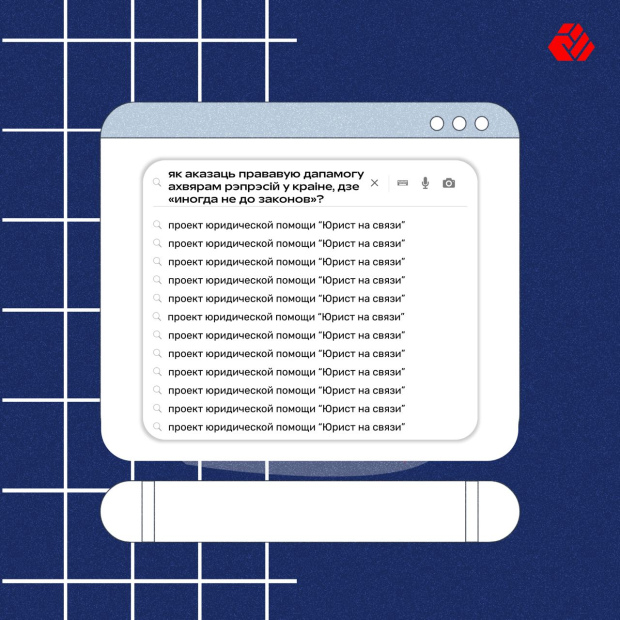It is very difficult, but still possible. What requests do Belarusians make to the lawyers of "A Country to Live in" fund? We talked about it with the coordinator of the legal aid project "Lawyer in Touch".
–– We launched the legal service in 2022. Our target audience is divided into three conditional groups, –– tells Alla (the name of the interlocutor has been changed for security purposes. –– Ed.). The first is relatives of political prisoners and political prisoners themselves. The second is an NGO. Their questions relate to situations related to what is happening in Belarus. And the third category – these are activists, we apply a broader term to them – “repressed”, because almost every one of them faced persecution from the authorities.
These three categories are divided into two subcategories: those in the country and those outside the country.
At the very beginning, we focused mainly on those who are in the country and positioned ourselves as a project that provides legal advice according to Belarusian legislation. We continue to work in this direction, it is a priority. But because after the events of 2020, Belarusians began to be pushed out of the country in masse, we expanded the range of our activities.
If we talk about the categories in more detail, relatives of political prisoners in Belarus often ask questions about illegal dismissal from work, for example. It is not officially written in the papers about dismissal from office, but people, especially those who work in state institutions, tell us that they are called to the management's offices and told: "You have a relative sitting in jail because of politics. So, let's say goodbye to each other."
The business of those whose relatives are political prisoners is also under pressure. We also receive requests from such people. They ask what to do.
We also work with students who are expelled from universities for political activity.
Alla says that relatives of political prisoners receive a lot of questions about the execution procedure. For example, what will happen to the property of a political prisoner who is serving a sentence, especially if he has been fined:
–– A person, for example, has a joint household with his wife, relatives ask what will happen to the same microwave –– will they take it away or not? Or a political prisoner is registered in an apartment with someone else, and the house has been seized. What to do in this case? The second common question is that loved ones want to get some information about their relative who a political prisoner is, especially if he or she has been in isolation for a long time and there is no contact with him. They say: help us please find out if he or she is alive or not, what is his or her health condition and is he or she now in punishment cell?
We help the family to make a special request to the management of the penitentiary institution. We study the case, individually prepare documents that can be sent to official structures, and give instructions on how to proceed, what to do if there is no answer.
We understand Belarusians who are in the country are taking a certain risk by contacting us, sending questions to our legal bot –– we are "extremists" in the eyes of the authorities. Therefore, we ask everyone who contacts us to take care of digital security and offer support from volunteers to help them clean their phones and take other measures in this direction.
The interlocutor says that relatives of political prisoners who have already left abroad turn to the legal service with completely different questions. Issues of legalization and other issues related to living abroad are added. Relatives are interested in whether it is possible, for example, to open a bank card in the name of a political prisoner abroad.
As for non-governmental organizations, there were no such requests from Belarus at all, says the lawyer. And she adds: she "had a warm hope that they would still be."
–– Unfortunately, everything is completely cleaned there, –– states Alla bitterly. –– That's why we receive requests from those NGOs that are already abroad. The most extraordinary case, perhaps, is when we were approached by a Russian NGO, which now works abroad and is engaged, among other things, in highlighting the rights of Russian political prisoners.
So the Belarusian authorities recognized one of her Internet resources as "extremist materials". And such a situation is not unique, when liberal Russian Internet resources are recognized as "extremist" on the territory of Belarus. So this organization was at a loss: they turned to us and asked for advice: what to do now, what does this mean, how to communicate with the Belarusian audience in such conditions?
–– Political prisoners who have already been released and have gone abroad also apply. The range of issues they have is different: it is both legalization and property in Belarus – what to do with it, how to sell it, how to deal with the fines imposed on them by the authorities?
Repressed Belarusians ask how to register a foundation in Poland, for example, says Alla. –– One of the most difficult cases is when Belarusians contact us from abroad, on which criminal cases have been initiated at home, and the authorities are trying to confiscate the house or apartment. And in the apartment, for example, the adult parents of this person are registered... It is very difficult to work with such cases. We study the trends of court decisions, consult with colleagues and try to develop some kind of thorough solution for such situations. And, of course, we always advise: if it's not too late, transfer your property to someone else as soon as possible or make a power of attorney.
Activists who have gone abroad also often apply for legalization, ask how to register a car, there were a lot of questions about student visas at one time. There are also Belarusians who went abroad not on humanitarian grounds (but, for example, on a work visa), but they got political problems at home –– a person often gets lost in such a case. We try to help as efficiently as possible ourselves or redirect to other consulting services.
When in January 2024, the KGB organized a massive roundup of relatives of political prisoners for e-delivery, an incredible number of those who were persecuted at that time turned to our bot. To be honest, our legal department has been processing all these requests for three weeks...
We helped to draw up complaints on administrative offense reports, developed individual documents for each case.
When people are called in for questioning, we also give detailed instructions on how to behave there, what to say, what to do with the reports and so on.
There are cases –– one of such recent cases is deeply etched in my memory –– when the husband of a political prisoner turned to us on the eve of the trial and said that the family refused a lawyer because they were afraid of worsening the woman's situation in this way. The man asked what he should do, and we legally accompanied this case remotely. We are very happy, if such a definition is appropriate, that the political prisoner got a rather lenient term as a result.
–– Issues related to children –– are also one of the most difficult, –– continues Alla. –– It happens that a political prisoner is serving a term, and the child's place of residence is determined by the court with his ex-wife. And here we are faced with various dramatic situations: the child's mother wants her ex-husband to pay alimony, but he does not have such an opportunity, because he is behind bars. It also happens that a woman does not allow grandparents to see their grandchildren. According to the law, they have such a right – we explain it to them.
Grandparents also complain about insults from former wives in private correspondence. Yes, on the one hand, according to the Code of Administrative Offenses, you can be prosecuted for an insult, but we always advise relatives to cool down and consider whether it is worth it. Will not such measures harm all participants in this drama, or will the consequences be even worse. And here there is even psychology, not jurisprudence.
There are other dramatic stories: the repressed Belarusian is already abroad but cannot transfer alimony to the Belarusian bank card of his ex-wife. When we are approached with such requests, we try to defuse the situation as much as possible with the help of compromises, somehow extinguish the level of emotions on both sides.
Ala sums up that in the conditions of increased repression, Belarusians have become more actively interested in their rights, so that their service has enough work.
Illegal dismissals, business under pressure
–– We launched the legal service in 2022. Our target audience is divided into three conditional groups, –– tells Alla (the name of the interlocutor has been changed for security purposes. –– Ed.). The first is relatives of political prisoners and political prisoners themselves. The second is an NGO. Their questions relate to situations related to what is happening in Belarus. And the third category – these are activists, we apply a broader term to them – “repressed”, because almost every one of them faced persecution from the authorities.
These three categories are divided into two subcategories: those in the country and those outside the country.
At the very beginning, we focused mainly on those who are in the country and positioned ourselves as a project that provides legal advice according to Belarusian legislation. We continue to work in this direction, it is a priority. But because after the events of 2020, Belarusians began to be pushed out of the country in masse, we expanded the range of our activities.
If we talk about the categories in more detail, relatives of political prisoners in Belarus often ask questions about illegal dismissal from work, for example. It is not officially written in the papers about dismissal from office, but people, especially those who work in state institutions, tell us that they are called to the management's offices and told: "You have a relative sitting in jail because of politics. So, let's say goodbye to each other."
The business of those whose relatives are political prisoners is also under pressure. We also receive requests from such people. They ask what to do.
We also work with students who are expelled from universities for political activity.
"Please help find out if is our relative alive?"
Alla says that relatives of political prisoners receive a lot of questions about the execution procedure. For example, what will happen to the property of a political prisoner who is serving a sentence, especially if he has been fined:
–– A person, for example, has a joint household with his wife, relatives ask what will happen to the same microwave –– will they take it away or not? Or a political prisoner is registered in an apartment with someone else, and the house has been seized. What to do in this case? The second common question is that loved ones want to get some information about their relative who a political prisoner is, especially if he or she has been in isolation for a long time and there is no contact with him. They say: help us please find out if he or she is alive or not, what is his or her health condition and is he or she now in punishment cell?
We help the family to make a special request to the management of the penitentiary institution. We study the case, individually prepare documents that can be sent to official structures, and give instructions on how to proceed, what to do if there is no answer.
We understand Belarusians who are in the country are taking a certain risk by contacting us, sending questions to our legal bot –– we are "extremists" in the eyes of the authorities. Therefore, we ask everyone who contacts us to take care of digital security and offer support from volunteers to help them clean their phones and take other measures in this direction.
Russians also fall under the handout
The interlocutor says that relatives of political prisoners who have already left abroad turn to the legal service with completely different questions. Issues of legalization and other issues related to living abroad are added. Relatives are interested in whether it is possible, for example, to open a bank card in the name of a political prisoner abroad.
As for non-governmental organizations, there were no such requests from Belarus at all, says the lawyer. And she adds: she "had a warm hope that they would still be."
–– Unfortunately, everything is completely cleaned there, –– states Alla bitterly. –– That's why we receive requests from those NGOs that are already abroad. The most extraordinary case, perhaps, is when we were approached by a Russian NGO, which now works abroad and is engaged, among other things, in highlighting the rights of Russian political prisoners.
So the Belarusian authorities recognized one of her Internet resources as "extremist materials". And such a situation is not unique, when liberal Russian Internet resources are recognized as "extremist" on the territory of Belarus. So this organization was at a loss: they turned to us and asked for advice: what to do now, what does this mean, how to communicate with the Belarusian audience in such conditions?
When the government confiscate the apartment
–– Political prisoners who have already been released and have gone abroad also apply. The range of issues they have is different: it is both legalization and property in Belarus – what to do with it, how to sell it, how to deal with the fines imposed on them by the authorities?
Repressed Belarusians ask how to register a foundation in Poland, for example, says Alla. –– One of the most difficult cases is when Belarusians contact us from abroad, on which criminal cases have been initiated at home, and the authorities are trying to confiscate the house or apartment. And in the apartment, for example, the adult parents of this person are registered... It is very difficult to work with such cases. We study the trends of court decisions, consult with colleagues and try to develop some kind of thorough solution for such situations. And, of course, we always advise: if it's not too late, transfer your property to someone else as soon as possible or make a power of attorney.
Activists who have gone abroad also often apply for legalization, ask how to register a car, there were a lot of questions about student visas at one time. There are also Belarusians who went abroad not on humanitarian grounds (but, for example, on a work visa), but they got political problems at home –– a person often gets lost in such a case. We try to help as efficiently as possible ourselves or redirect to other consulting services.
When in January 2024, the KGB organized a massive roundup of relatives of political prisoners for e-delivery, an incredible number of those who were persecuted at that time turned to our bot. To be honest, our legal department has been processing all these requests for three weeks...
We helped to draw up complaints on administrative offense reports, developed individual documents for each case.
When people are called in for questioning, we also give detailed instructions on how to behave there, what to say, what to do with the reports and so on.
There are cases –– one of such recent cases is deeply etched in my memory –– when the husband of a political prisoner turned to us on the eve of the trial and said that the family refused a lawyer because they were afraid of worsening the woman's situation in this way. The man asked what he should do, and we legally accompanied this case remotely. We are very happy, if such a definition is appropriate, that the political prisoner got a rather lenient term as a result.
Family dramas are added
–– Issues related to children –– are also one of the most difficult, –– continues Alla. –– It happens that a political prisoner is serving a term, and the child's place of residence is determined by the court with his ex-wife. And here we are faced with various dramatic situations: the child's mother wants her ex-husband to pay alimony, but he does not have such an opportunity, because he is behind bars. It also happens that a woman does not allow grandparents to see their grandchildren. According to the law, they have such a right – we explain it to them.
Grandparents also complain about insults from former wives in private correspondence. Yes, on the one hand, according to the Code of Administrative Offenses, you can be prosecuted for an insult, but we always advise relatives to cool down and consider whether it is worth it. Will not such measures harm all participants in this drama, or will the consequences be even worse. And here there is even psychology, not jurisprudence.
There are other dramatic stories: the repressed Belarusian is already abroad but cannot transfer alimony to the Belarusian bank card of his ex-wife. When we are approached with such requests, we try to defuse the situation as much as possible with the help of compromises, somehow extinguish the level of emotions on both sides.
Ala sums up that in the conditions of increased repression, Belarusians have become more actively interested in their rights, so that their service has enough work.


 Continue
Continue
